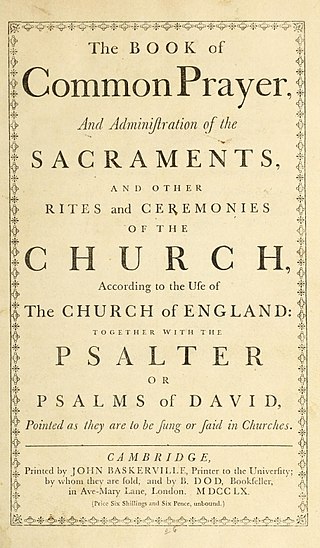
The Book of Common Prayer (BCP) is the name given to a number of related prayer books used in the Anglican Communion and by other Christian churches historically related to Anglicanism. The first prayer book, published in 1549 in the reign of King Edward VI of England, was a product of the English Reformation following the break with Rome. The 1549 work was the first prayer book to include the complete forms of service for daily and Sunday worship in English. It contains Morning Prayer, Evening Prayer, the Litany, Holy Communion, and occasional services in full: the orders for Baptism, Confirmation, Marriage, "prayers to be said with the sick", and a funeral service. It also sets out in full the "propers" : the introits, collects, and epistle and gospel readings for the Sunday service of Holy Communion. Old Testament and New Testament readings for daily prayer are specified in tabular format, as are the Psalms and canticles, mostly biblical, to be said or sung between the readings.

Anglo-Catholicism comprises beliefs and practices that emphasise the Catholic heritage and identity of the Church of England and various churches within Anglicanism. Anglo-Catholicism claims to restore liturgical and devotional expressions of church life that reflect the ancient practices of the early and medieval Church.

The Anglican Use, also known as Divine Worship, is a use of the Roman Rite celebrated by the personal ordinariates, originally created for former Anglicans who converted to Catholicism while wishing to maintain "aspects of the Anglican patrimony that are of particular value" and includes former Methodist converts to Catholicism who wish to retain aspects of Anglican and Methodist heritage, liturgy, and tradition. Its most common occurrence is within parishes of the personal ordinariates which were erected in 2009. Upon the promulgation of Divine Worship: The Missal, the term "Anglican Use" was replaced by "Divine Worship" in the liturgical books and complementary norms, though "Anglican Use" is still used to describe these liturgies as they existed from the papacy of John Paul II to present.

The Book of Divine Worship (BDW) is an adaptation of the American Book of Common Prayer (BCP) by the Catholic Church. It was used primarily by former members of the Episcopal Church within Anglican Use parishes of the Pastoral Provision and the Personal Ordinariates. It has been replaced by a new book to be used worldwide, titled Divine Worship: The Missal.

The Liturgy of the Hours, Divine Office, or Opus Dei are a set of Catholic prayers comprising the canonical hours, often also referred to as the breviary, of the Latin Church. The Liturgy of the Hours forms the official set of prayers "marking the hours of each day and sanctifying the day with prayer." The term "Liturgy of the Hours" has been retroactively applied to the practices of saying the canonical hours in both the Christian East and West–particularly within the Latin liturgical rites–prior to the Second Vatican Council, and is the official term for the canonical hours promulgated for usage by the Latin Church in 1971. Before 1971, the official form for the Latin Church was the Breviarium Romanum, first published in 1568 with major editions through 1962.
The Pastoral Provision is a set of practices and norms in the Catholic Church in the United States, by which bishops are authorized to provide spiritual care for Catholics converting from the Anglican tradition, by establishing parishes for them and ordaining priests from among them. The provision provides a way for individuals to become priests in territorial dioceses, even after Pope Benedict XVI's apostolic constitution Anglicanorum Coetibus established the Personal Ordinariates, a non-diocesan mechanism for former Anglicans to join the Church.
The Traditional Anglican Church (TAC), formerly the Traditional Anglican Communion, is an international church consisting of national provinces in the continuing Anglican movement, independent of the Anglican Communion and the Archbishop of Canterbury. The TAC upholds the theological doctrines of the Affirmation of St. Louis. Each of the respective jurisdictions utilizes a traditional Book of Common Prayer deemed to be free of theological deviation. Most parishioners of these churches would be described as being traditional Prayer Book Anglicans in their theology and liturgical practice. Some Anglo-Catholic parishes use the Anglican Missal in their liturgies. The TAC is governed by a college of bishops from across the church and headed by an elected primate.
Anglican Papalism, also referred to as Anglo-Papalism, is a subset of Anglo-Catholicism with adherents manifesting a particularly high degree of influence from, and even identification with, the Roman Catholic Church. This position has historically been referred to as Anglican Papalism; the term Anglo-Papalism is an American neologism and it seems not to have appeared in print prior to the 1990s. Anglican Papalists have suggested "that the only way to convert England is by means of an 'English Uniate' rite". Anglican Papalists have historically practiced praying the Dominican rosary, among other Marian devotions, Corpus Christi procession, as well as the reservation of and Benediction of the Blessed Sacrament.

Latin liturgical rites, or Western liturgical rites, is a large family of liturgical rites and uses of public worship employed by the Latin Church, the largest particular church sui iuris of the Catholic Church, that originated in Europe where the Latin language once dominated. Its language is now known as Ecclesiastical Latin. The most used rite is the Roman Rite.
The Prayer of Humble Access is the name traditionally given to a prayer originally from early Anglican Books of Common Prayer and contained in many Anglican, Methodist, Presbyterian, and other Christian eucharistic liturgies, including use by the personal ordinariates for former Anglican groups reconciled to the Catholic Church. Its origins lie in the healing the centurion's servant as recounted in two of the Gospels. It is comparable to the "Domine, non sum dignus" used in the Catholic Mass.
A personal ordinariate for former Anglicans, shortened as personal ordinariate or Anglican ordinariate, is a canonical structure within the Catholic Church established in order to enable "groups of Anglicans" and Methodists to join the Catholic Church while preserving elements of their liturgical and spiritual patrimony.
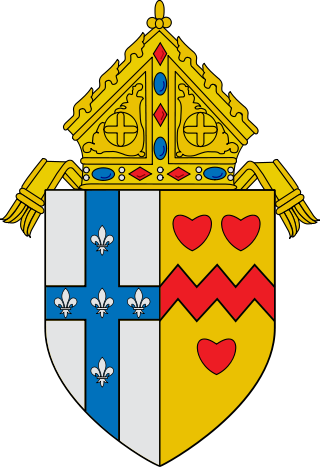
The Personal Ordinariate of Our Lady of Walsingham in England and Wales is a personal ordinariate in the Latin Church of the Catholic Church immediately exempt, being directly subject to the Holy See. It is within the territory of the Catholic Bishops' Conference of England and Wales, of which its ordinary is a member, and also encompasses Scotland. It was established on 15 January 2011 for groups of former Anglicans in England and Wales in accordance with the apostolic constitution Anglicanorum coetibus of Pope Benedict XVI, which was supplemented with the Complementary Norms of Pope Francis in 2013.
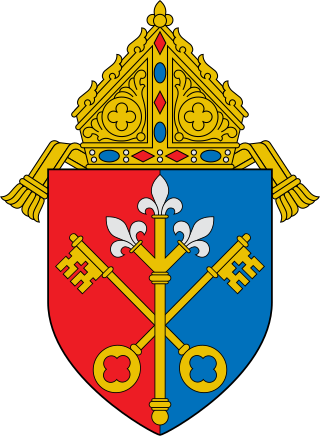
The Personal Ordinariate of the Chair of Saint Peter is a Latin Church ecclesiastical jurisdiction or personal ordinariate of the Catholic Church for Anglican converts in the United States and Canada. It allows these parishioners to maintain elements of Anglican liturgy and tradition in their services. The ordinariate was established by the Vatican in 2012.

The Personal Ordinariate of Our Lady of the Southern Cross is a personal ordinariate of the Latin Church of the Catholic Church primarily within the territory of the Australian Catholic Bishops' Conference. It is organized to serve groups of Anglicans who desire full communion with the Catholic Church in Australia and Asia. Personal ordinariates, like military ordinariates and dioceses, are immediately subject to the Holy See in Rome. The motto of the ordinariate is Mea Gloria Fides. The current apostolic administrator is Anthony Randazzo, who succeeded the second ordinary, Carl Reid, in 2023.

The Cathedral of Our Lady of Walsingham in Houston, Texas, is a Catholic church that serves as the cathedral of the Personal Ordinariate of the Chair of Saint Peter.
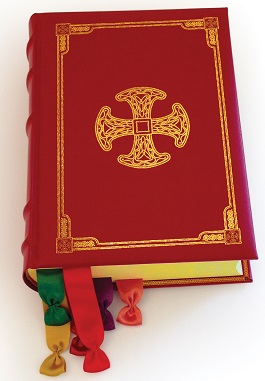
Divine Worship: The Missal (DW:TM) is the liturgical book containing the instructions and texts for the celebration of Mass by the former Anglicans within the Catholic Church in the three personal ordinariates of Great Britain, United States and Canada, and Australia. The rite contained in this missal is the Anglican Use, a liturgical use of the Roman Rite Mass with elements of Anglican worship. It was approved for use beginning on the first Sunday of Advent, November 29, 2015.

Carl Leonard Reid is a Canadian Roman Catholic priest, who was the ordinary of the Personal Ordinariate of Our Lady of the Southern Cross in Australia until 21 April 2023 when his resignation was accepted. He is a former bishop of the Anglican Catholic Church of Canada, a Continuing Anglican church within the Traditional Anglican Communion; he was received into the Catholic Church in 2012 and was ordained a priest of the Personal Ordinariate of the Chair of Saint Peter.

The 1979 Book of Common Prayer is the official primary liturgical book of the U.S.-based Episcopal Church. An edition in the same tradition as other versions of the Book of Common Prayer used by the churches within the Anglican Communion and Anglicanism generally, it contains both the forms of the Eucharistic liturgy and the Daily Office, as well as additional public liturgies and personal devotions. It is the fourth major revision of the Book of Common Prayer adopted by the Episcopal Church, and succeeded the 1928 edition. The 1979 Book of Common Prayer has been translated into multiple languages and is considered a representative production of the 20th-century Liturgical Movement.
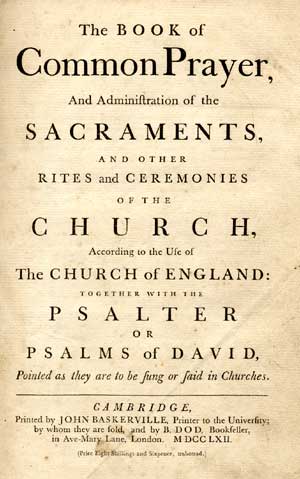
The 1662 Book of Common Prayer is an authorised liturgical book of the Church of England and other Anglican bodies around the world. In continuous print and regular use for over 360 years, the 1662 prayer book is the basis for numerous other editions of the Book of Common Prayer and other liturgical texts. Noted for both its devotional and literary quality, the 1662 prayer book has influenced the English language, with its use alongside the King James Version of the Bible contributing to an increase in literacy from the 16th to the 20th century.

















